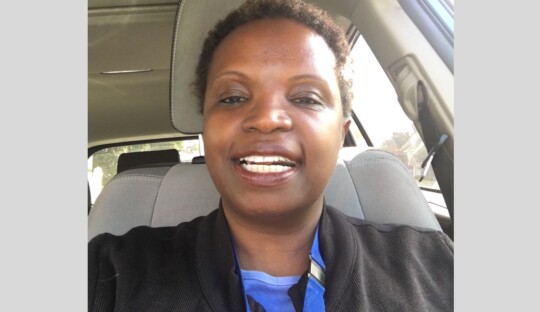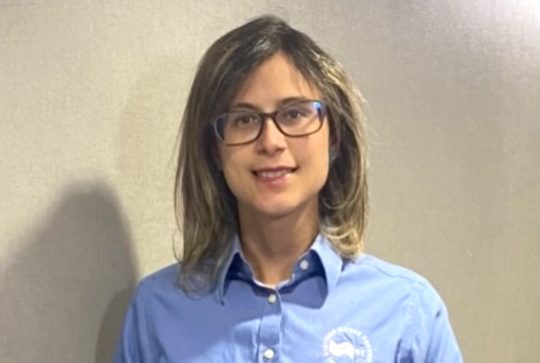CMHS’s Assertive Community Treatment Nurses: Fostering Stability in Uncertain Times
While much of New York is on hold because of the coronavirus pandemic, the dedicated behavioral health nurses of VNSNY’s Assertive Community Treatment (ACT) program have been working extra hard to connect with their clients. The ACT, which is part of VNSNY’s Community Mental Health Services (CMHS), provides care to individuals who are dealing with severe mental illness and substance abuse, making sure they take their medications and that they have the housing, food and essential mental health treatment they need to keep them on a healthy path.
The COVID-19 emergency has made this job more complicated: The ACT teams have been trying to reduce their home visits and move clients to oral medications where possible, but many still require intramuscular medication (IM)—injections delivered by a nurse—because they have trouble taking their oral medications consistently. And so the program’s nurses continue to make regular trips to see these clients and administer their medications, despite the pandemic.
 “It is more challenging to get to patients during COVID-19, but many of them really need us to visit them at home,” says Collette Hendricks, a nurse with the Queens ACT team. “They look forward to our visits, and would be in bad shape if we couldn’t see them.”
“It is more challenging to get to patients during COVID-19, but many of them really need us to visit them at home,” says Collette Hendricks, a nurse with the Queens ACT team. “They look forward to our visits, and would be in bad shape if we couldn’t see them.”
To do this safely, the ACT nurses first screen each client by phone to make sure they have no COVID-19 symptoms, then carefully put on protective masks, goggles, gloves and gowns before entering the client’s home. The in-home visits are shorter than usual, and are focused on giving the clients injections. Still, Collette notes, “I’m always needing to build a therapeutic relationship with them.”
 Marie Tisi, a nurse with the Brooklyn ACT team who has been with VNSNY for 20 years, says that these visits by the program’s nurses are needed now more than ever. “If we don’t keep our clients stable, that will undo all the progress they’ve made, and they may wind up in the criminal justice system, which is the last place they’re going to get care,” she says. “That’s what keeps me motivated—knowing that without us, our clients are likely to end up in a big heap of trouble that they didn’t ask for and don’t deserve.”
Marie Tisi, a nurse with the Brooklyn ACT team who has been with VNSNY for 20 years, says that these visits by the program’s nurses are needed now more than ever. “If we don’t keep our clients stable, that will undo all the progress they’ve made, and they may wind up in the criminal justice system, which is the last place they’re going to get care,” she says. “That’s what keeps me motivated—knowing that without us, our clients are likely to end up in a big heap of trouble that they didn’t ask for and don’t deserve.”
“Anxiety levels are certainly high,” agrees Collette. “It’s very important for our clients to see an encouraging face. When they feel they’re in the dustpan, we can elevate them and remind them they’re part of society. I have what I need, including the gear, to get to the end of this and continue being the nurse that I want to be.”

Cristina Vasile, ACT team nurse
Cristina Vasile, a part-time nurse on the Manhattan ACT team, adds that the positive impact of the nurses’ visits in these uncertain times is clear. “I visited a client last Friday—and this is a person who never smiles,” she recalls. “Well, this time when he saw me, he smiled.”
The ACT program supervisors—Marion Spencer, Amy Amadasu, Chelsea Hall, Olga Shneyderman, Paula Stephenson and Associate Director Jessica Aitken—praise all the nurses on the Queens, Manhattan, Brooklyn Bronx and Shelter ACT teams for going “above and beyond” in meeting their clients’ needs during the coronavirus emergency. In addition to Collette, Marie and Cristina, these nurses include Diana Simmons in Manhattan, Dorrett Dennis and NP Andrea Abramoff in the Bronx, Oluwatobi Ademegoke in Brooklyn, Jocelyne Telfort in Queens, and Mary Wight with the program’s Shelters team.

CMHS Assertive Community Treatment behavioral health nurses: Mary Wight (left) and Diana Simmons.
“We see behind the mental illness, to the person each of our clients is,” says Marion, who was about to go deliver food—carefully leaving it outside the home—for a client who just lost a family member to COVID-19. “We reassure them that they can always reach out to us, and we will be here. No matter what, we are still their treatment team, here to support them in perilous times.”
The New York State Emotional Support Line is 1-844-863-9314. It provides free and confidential support to callers experiencing increased anxiety due to the coronavirus emergency.


